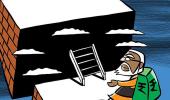The government has exhausted only 39 per cent of its fiscal deficit target in the first half of FY24.

The first supplementary demands for grants for 2023-2024 (FY24), to be presented in the upcoming winter session of Parliament, is unlikely to involve any major cash outflow, as the government aims to meet the 5.9 per cent of gross domestic product (GDP) fiscal deficit target amid a slowdown in nominal GDP growth.
"We are seeing quite a bit of rejigging of provisions being made. We will draw the supplementary demands based on the discussions on Revised Estimates with the departments, which have been completed. I don't foresee a major cash outflow as of today," said a finance ministry official.
The winter session of Parliament will commence on December 4, a day after the assembly election results of Chhattisgarh, Madhya Pradesh, Mizoram, Rajasthan and Telangana are announced, and will continue until December 22.
With 15 sittings spread across 19 days, it is poised to become the second-shortest winter session of the current Lok Sabha.
Supplementary demands involve completely new items of expenditure that were not in the Budget (new services), such as the Pradhan Mantri Vishwakarma Yojana, and substantial increases in existing lines of expenditure (new instruments of services), such as the rural job guarantee scheme and food subsidies.
Denying any instruction from the finance ministry to departments to slow down expenditure, the official said the government is maintaining a high cash balance with the Reserve Bank of India because a big repayment (Rs 2 trillion) is due in November/December.
"But we are not restricting expenditure for anybody at all," the source added.
The government has exhausted only 39 per cent of its fiscal deficit target in the first half (April-September) of FY24.
Some economists have raised concerns that the slow pace of government expenditure may lead to demand compression in the economy.
While revenue collections have remained robust so far, persistent deflation in the wholesale price index is expected to keep nominal GDP depressed in FY24, well below the 10.5 per cent target set in the Budget.
However, the official said that irrespective of nominal GDP, the government will stick to the 5.9 per cent fiscal deficit target this financial year (FY24).
Supplementary demands for grants could be cash, token, or technical.
While cash involves a substantial fresh allocation not foreseen in the Budget, the token is a small allocation, while technical allocation is rejigged in the current allocation for a different scheme.
Last year, the government announced it would have two supplementary demands for grants in a year, deviating from the usual practice of three in a year.
"Departments were asked to intelligently act, reflectively budget so that they don't come every now and then for small expenditure demands," the official added.
The second supplementary demands for grants will be presented during the Budget session of Parliament in February.
Regarding the upcoming interim Budget ahead of the general election, the official said the Budget arithmetic can't be wobbly and has to be credible; otherwise, it would send the wrong signal to the market.
The official also stated that the government has no plan to tinker with the existing borrowing calendar for FY24.
Feature Presentation: Aslam Hunani/Rediff.com












 © 2025
© 2025